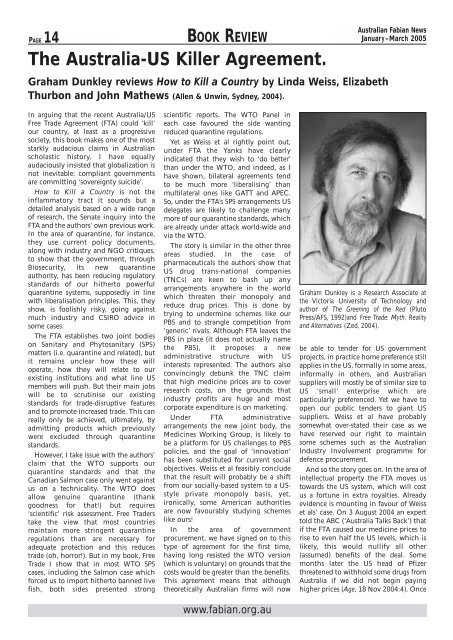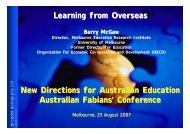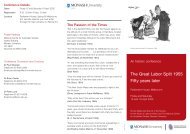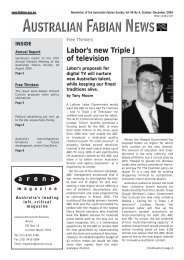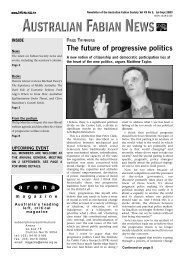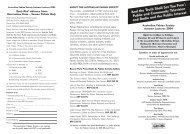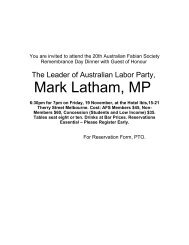Vol 45 No 1 - Australian Fabian Society
Vol 45 No 1 - Australian Fabian Society
Vol 45 No 1 - Australian Fabian Society
You also want an ePaper? Increase the reach of your titles
YUMPU automatically turns print PDFs into web optimized ePapers that Google loves.
PAGE 14BOOK REVIEWThe Australia-US Killer Agreement.Graham Dunkley reviews How to Kill a Country by Linda Weiss, ElizabethThurbon and John Mathews (Allen & Unwin, Sydney, 2004).<strong>Australian</strong> <strong>Fabian</strong> NewsJanuary–March 2005In arguing that the recent Australia/USFree Trade Agreement (FTA) could ‘kill’our country, at least as a progressivesociety, this book makes one of the moststarkly audacious claims in <strong>Australian</strong>scholastic history. I have equallyaudaciously insisted that globalization isnot inevitable: compliant governmentsare committing ‘sovereignty suicide’.How to Kill a Country is not theinflammatory tract it sounds but adetailed analysis based on a wide rangeof research, the Senate inquiry into theFTA and the authors’ own previous work.In the area of quarantine, for instance,they use current policy documents,along with industry and NGO critiques,to show that the government, throughBiosecurity, its new quarantineauthority, has been reducing regulatorystandards of our hitherto powerfulquarantine systems, supposedly in linewith liberalisation principles. This, theyshow, is foolishly risky, going againstmuch industry and CSIRO advice insome cases.The FTA establishes two joint bodieson Sanitary and Phytosanitary (SPS)matters (i.e. quarantine and related), butit remains unclear how these willoperate, how they will relate to ourexisting institutions and what line USmembers will push. But their main jobswill be to scrutinise our existingstandards for trade-disruptive featuresand to promote increased trade. This canreally only be achieved, ultimately, byadmitting products which previouslywere excluded through quarantinestandards.However, I take issue with the authors’claim that the WTO supports ourquarantine standards and that theCanadian Salmon case only went againstus on a technicality. The WTO doesallow genuine quarantine (thankgoodness for that!) but requires‘scientific’ risk assessment. Free Traderstake the view that most countriesmaintain more stringent quarantineregulations than are necessary foradequate protection and this reducestrade (oh, horror!). But in my book, FreeTrade I show that in most WTO SPScases, including the Salmon case whichforced us to import hitherto banned livefish, both sides presented strongscientific reports. The WTO Panel ineach case favoured the side wantingreduced quarantine regulations.Yet as Weiss et al rightly point out,under FTA the Yanks have clearlyindicated that they wish to ‘do better’than under the WTO, and indeed, as Ihave shown, bilateral agreements tendto be much more ‘liberalising’ thanmultilateral ones like GATT and APEC.So, under the FTA’s SPS arrangements USdelegates are likely to challenge manymore of our quarantine standards, whichare already under attack world-wide andvia the WTO.The story is similar in the other threeareas studied. In the case ofpharmaceuticals the authors show thatUS drug trans-national companies(TNCs) are keen to bash up anyarrangements anywhere in the worldwhich threaten their monopoly andreduce drug prices. This is done bytrying to undermine schemes like ourPBS and to strangle competition from‘generic’ rivals. Although FTA leaves thePBS in place (it does not actually namethe PBS), it proposes a newadministrative structure with USinterests represented. The authors alsoconvincingly debunk the TNC claimthat high medicine prices are to coverresearch costs, on the grounds thatindustry profits are huge and mostcorporate expenditure is on marketing.Under FTA administrativearrangements the new joint body, theMedicines Working Group, is likely tobe a platform for US challenges to PBSpolicies, and the goal of ‘innovation’has been substituted for current socialobjectives. Weiss et al feasibly concludethat the result will probably be a shiftfrom our socially-based system to a USstyleprivate monopoly basis, yet,ironically, some American authoritiesare now favourably studying schemeslike ours!In the area of governmentprocurement, we have signed on to thistype of agreement for the first time,having long resisted the WTO version(which is voluntary) on grounds that thecosts would be greater than the benefits.This agreement means that althoughtheoretically <strong>Australian</strong> firms will nowwww.fabian.org.auGraham Dunkley is a Research Associate atthe Victoria University of Technology andauthor of The Greening of the Red (PlutoPress/AFS, 1992)and Free Trade: Myth, Realityand Alternatives (Zed, 2004).be able to tender for US governmentprojects, in practice home preference stillapplies in the US, formally in some areas,informally in others, and <strong>Australian</strong>suppliers will mostly be of similar size toUS ‘small’ enterprise which areparticularly preferenced. Yet we have toopen our public tenders to giant USsuppliers. Weiss et al have probablysomewhat over-stated their case as wehave reserved our right to maintainsome schemes such as the <strong>Australian</strong>Industry Involvement programme fordefence procurement.And so the story goes on. In the area ofintellectual property the FTA moves ustowards the US system, which will costus a fortune in extra royalties. Alreadyevidence is mounting in favour of Weisset als’ case. On 3 August 2004 an experttold the ABC (‘Australia Talks Back’) thatif the FTA caused our medicine prices torise to even half the US levels, which islikely, this would nullify all other(assumed) benefits of the deal. Somemonths later the US head of Pfizerthreatened to withhold some drugs fromAustralia if we did not begin payinghigher prices (Age, 18 <strong>No</strong>v 2004:4). Once


